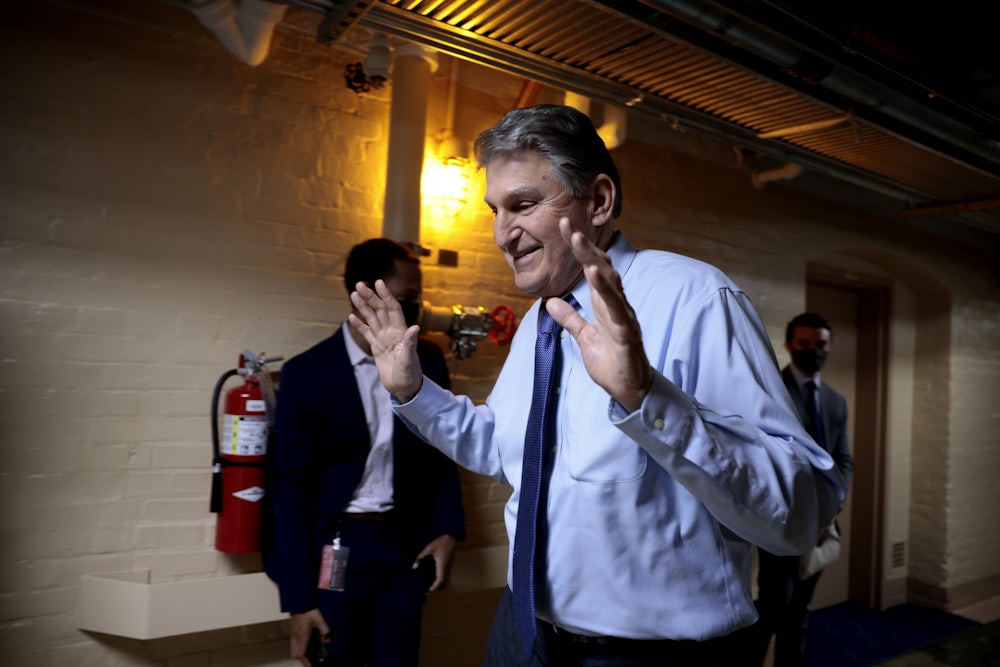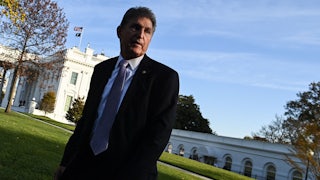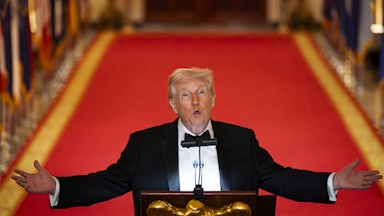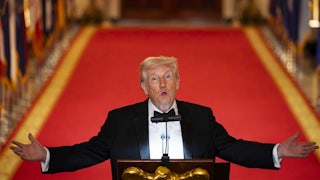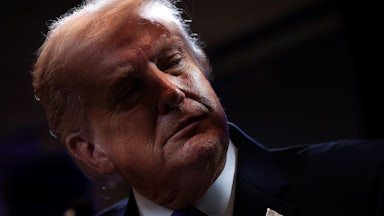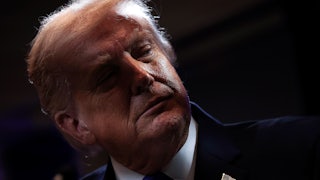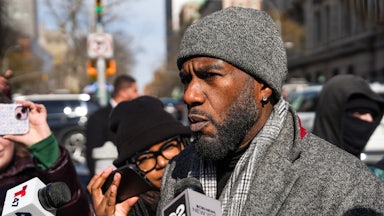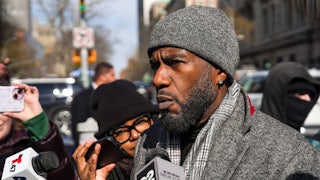Democrats have been forced back to the drawing board after Senator Joe Manchin announced on Sunday that he could not support the current version of the Build Back Better Act, President Biden’s signature legislation investing in childcare, health care, and combating climate change.
“I cannot vote to continue with this piece of legislation. I just can’t. I’ve tried everything humanly possible. I can’t get there,” Manchin said in an interview with Fox News on Sunday. Manchin’s announcement rankled his Democratic colleagues in the Senate and the White House; press secretary Jen Psaki implied in a scorching statement on Sunday that Manchin had gone back on his word to the president in his opposition to the bill. Representative Pramila Jayapal said in a press call on Monday that Manchin had demonstrated a “lack of integrity.”
But Democrats are not yet willing to give up hope on the legislation, even as they publicly swipe at Manchin. Senate Majority Leader Chuck Schumer pledged that the Build Back Better Act would get a vote when the Senate returns in January, which would force Manchin to go on the record with his opposition. Schumer said the vote will ensure “every member of this body has the opportunity to make their position known on the Senate floor, not just on television,” referring to Manchin’s interview on Fox News. “We are going to vote on a revised version of the House-passed Build Back Better Act—and we will keep voting on it until we get something done,” Schumer said.
Jayapal said that “we will continue to work on the legislative front” but called on Biden to take executive action to tackle portions of the Build Back Better agenda. “We can no longer wait on one man to do what the country needs. We now call on the president to keep his commitment to us that we would build back better,” Jayapal said. “We need to start acting immediately.”
Some Democrats had already been of the opinion that the Build Back Better Act should be focused on extending fewer programs for a longer period of time—as long as a decade—rather than more programs for a shorter period. (Enacting a greater number of programs also contributed to the budget gimmickry that helped to turn Manchin off the bill; Democrats claimed to want to extend the programs for just a few years but actually intended for them to be permanent, meaning that the cost would be higher than the initial bill suggested.)
“At the start of these negotiations many months ago, we called for prioritizing doing a few things well for longer, and we believe that adopting such an approach could open a potential path forward for this legislation,” said Representative Suzan DelBene, the chair of the New Democrat Coalition, an ideological caucus that prides itself on political pragmatism.
Senator Ron Wyden, the chair of the Finance Committee, echoed this sentiment, suggesting in a Sunday statement that the Build Back Better Act could be pared down to some of its most basic components, such as “providing financial security for families, lowering the costs of health care and prescription drugs for seniors, and creating clean energy jobs by combating the climate crisis.”
Wyden singled out the child tax credit, calling it “Social Security for our children.” He also argued that “this is our last chance to prevent the most catastrophic effects of the climate crisis.” Due to Manchin’s opposition to sticks in combating climate change, the package is filled with carrots: incentives for utility companies to switch to clean energy and credits for consumers to invest in green products, such as electric vehicles. On health care, Wyden’s statement focused on allowing Medicare to negotiate drug prices and expanding health care subsidies under the Affordable Care Act.
But this strategy may not be as feasible as hopeful Democrats would like to believe. The cost of extending the expanded child tax credit alone for 10 years would be around $1.6 trillion, a little less than the $1.75 trillion Manchin has said he is able to accept. Moreover, Manchin has expressed skepticism about both the child tax credit and climate provisions.
In his statement released on Sunday, Manchin appeared to argue that there was no need to enact additional climate-related measures, as the economy was already switching over to clean energy. “In the last two years, as Chairman of the Senate Energy and Natural Resources Committee and with bipartisan support, we have invested billions of dollars into clean energy technologies so we can continue to lead the world in reducing emissions through innovation,” he said. “But to do so at a rate that is faster than technology or the markets allow will have catastrophic consequences for the American people like we have seen in both Texas and California in the last two years.”
But advocates argue that the rapidly warming planet and the increased number of natural disasters necessitate immediate action. Democrats had already dropped the Clean Electricity Performance Program from the Build Back Better Act to appease Manchin, believing that the West Virginia senator would support an agenda that was solely comprised of incentives. “‘I can’t get there.’ I’ve heard that before, when Manchin killed off the Clean Electricity Plan,” tweeted Senator Tina Smith, the primary champion of the CEPP. “He was wrong then and he’s dangerously wrong now.”
The legislation is also the centerpiece of the president’s climate agenda. Without the Build Back Better Act, it will be extremely difficult for the administration to reach its emissions reduction goals.
Manchin has also previously said that he believes the child tax credit should be further means-tested, meaning that the income threshold for receiving the full credit should be lowered. The current credit, expanded by the American Rescue Plan in March, provides $3,000 per year for children ages 6 through 17 and $3,600 for children under age 6, distributed in monthly installments, for single filers earning under $75,000 per year and couples earning under $150,000. Manchin has also suggested that the credit should be tied to work requirements, which would undermine one of the key provisions of the expanded credit: allowing households too poor to file income taxes to receive it. Some congressional Democrats believed that Manchin had dropped the work requirements idea, with a one-year extension of the credit instead of a longer extension. But Manchin’s comments on Monday appeared to refute that belief.
Manchin doubled down on his criticism of the child tax credit in a Monday interview on Talkline With Hoppy Kercheval, a West Virginia radio show. “Make sure that people are working. If it’s called a tax credit, you got to have a W-2,” he said. “At the end of the year, if they have no tax liabilities and are going to work, send ’em the money.” This would undermine the biggest changes Democrats made to the credit, by requiring parents to file taxes to receive the credit. Children, the ostensible beneficiaries of the credit, have no control over whether their parents work. HuffPost reported on Monday that Manchin has told his colleagues he believes West Virginians would spend the extra money on drugs, and The Washington Post reported that Manchin proposed a $1.8 trillion counteroffer to the president that excluded the child tax credit entirely.
It’s not all bad news for Democrats. Manchin signaled some provisions that he liked, such as lowering drug prices and tax reform. (Ironically, provisions raising taxes on the wealthy were stripped from the bill to accommodate Senator Kyrsten Sinema, the only other Democratic holdout on the Build Back Better Act.) But the trust between Manchin and his fellow Democrats, not to mention Manchin and the White House, appears to have been strained to the breaking point.
In his statement, Manchin cited concerns about the national debt and inflation as his primary reason for objecting to the bill, worrying that it could compromise economic recovery amid the rise of the omicron variant. But Goldman Sachs on Sunday downgraded its U.S. growth forecast in response to Manchin’s opposition, predicting that the fiscal outlook would be “more negative” if the Build Back Better Act is not passed.
“A failure to pass BBB has negative growth implications,” Goldman Sachs economist Jan Hatzius said in the report. Hatzius cited the uncertainty over the future of the child tax credit as a cause for concern, calling it the “most important question for the near-term outlook.”
